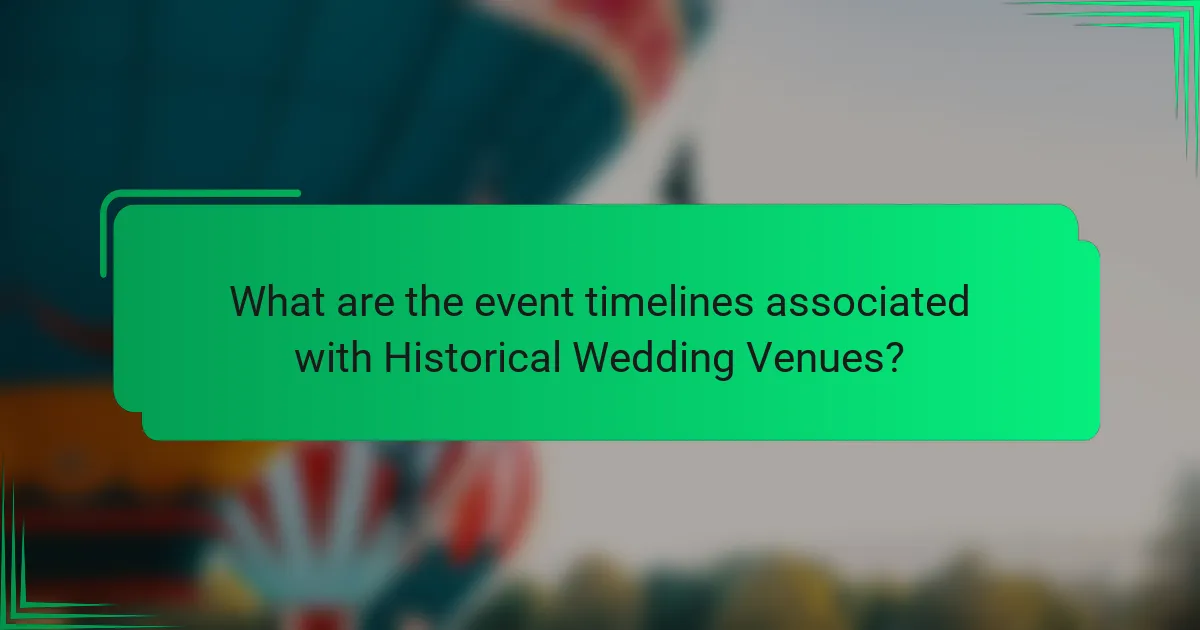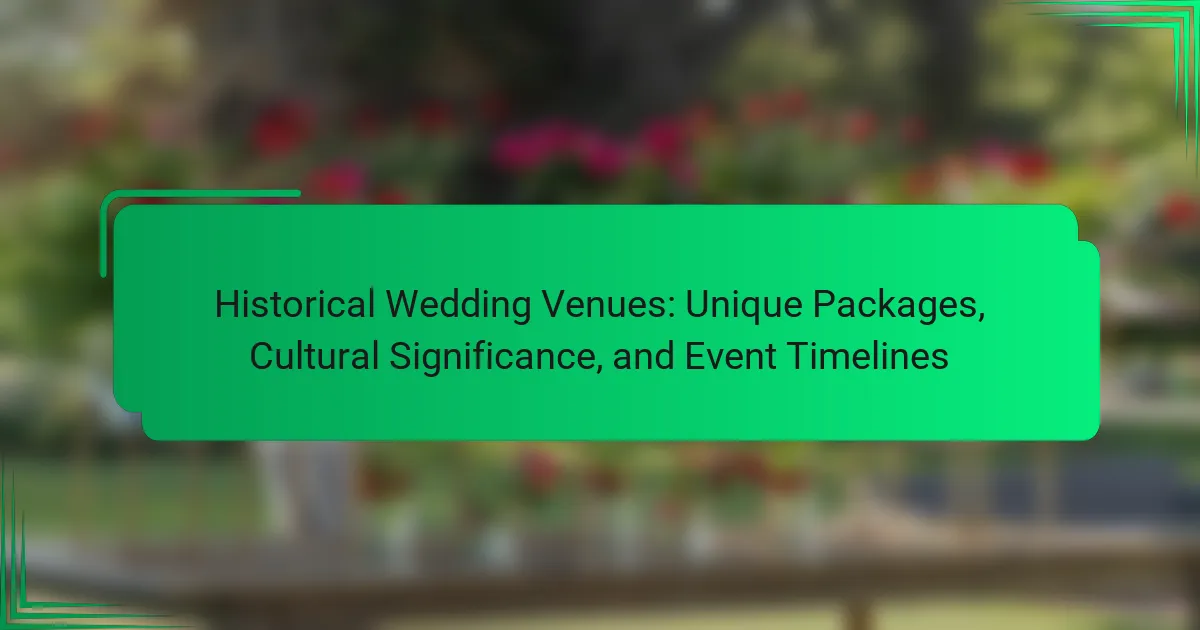Historical wedding venues are locations with significant historical value, featuring unique architecture and cultural heritage, such as castles, mansions, museums, and historic estates. These venues provide a romantic backdrop for weddings, often offering packages that include catering, decorations, and event planning services tailored to enhance the wedding experience. The cultural significance of these sites not only enriches the wedding theme but also preserves heritage and educates visitors. Additionally, understanding the event timelines associated with planning a wedding at these venues is crucial for couples, as it helps in securing the desired location and coordinating various aspects of the ceremony and reception.

What are Historical Wedding Venues?
Historical wedding venues are locations that have significant historical value and are often characterized by unique architecture or cultural heritage. These venues can include castles, mansions, museums, and historic estates. They provide a romantic and picturesque backdrop for weddings. Many historical venues offer packages that include catering, decorations, and event planning services. Such locations often attract couples seeking a distinctive experience. The cultural significance of these venues can enhance the wedding’s overall theme and atmosphere. In many cases, historical wedding venues are preserved to maintain their heritage and educate visitors. This preservation contributes to their appeal as wedding destinations.
How do Historical Wedding Venues differ from modern venues?
Historical wedding venues differ from modern venues primarily in architectural style and cultural significance. Historical venues often feature classic architecture, such as Victorian or Gothic styles. These structures may possess unique attributes, like intricate moldings or stained glass windows. In contrast, modern venues typically showcase contemporary designs with minimalist aesthetics.
Historical venues often come with rich stories and traditions, enhancing the wedding experience. They frequently provide a sense of nostalgia and connection to the past. Modern venues, however, focus on functionality and adaptability for various events.
Additionally, historical venues may have restrictions due to preservation laws. This can affect decor choices and capacity limits. Modern venues usually offer more flexibility in terms of layout and amenities. Overall, the key differences lie in aesthetic appeal, cultural context, and operational flexibility.
What architectural styles are commonly found in Historical Wedding Venues?
Common architectural styles found in historical wedding venues include Victorian, Georgian, Gothic Revival, and Colonial. Victorian architecture is characterized by ornate details and intricate designs. Georgian style features symmetry and classic proportions, often seen in grand estates. Gothic Revival architecture includes pointed arches and elaborate stonework, creating a dramatic ambiance. Colonial architecture reflects early American design, showcasing simplicity and functionality. These styles not only enhance the aesthetic appeal of wedding venues but also connect couples to historical significance and cultural heritage.
What historical periods influence the design of these venues?
The design of historical wedding venues is influenced by several key historical periods. These include the Renaissance, which emphasized symmetry and classical architecture. The Victorian era introduced ornate details and romantic styles. The Art Deco period brought geometric shapes and luxurious materials. Each period reflects cultural values and aesthetics of its time. For example, Renaissance venues often feature grand columns and frescoes. Victorian venues are known for intricate woodwork and elaborate gardens. Art Deco venues showcase bold colors and streamlined forms. These influences shape the character and ambiance of wedding venues today.
Why choose a Historical Wedding Venue?
Choosing a historical wedding venue offers a unique blend of charm and significance. These venues often feature stunning architecture and rich stories that enhance the wedding experience. Many historical sites are recognized for their cultural value, providing a memorable backdrop for ceremonies. The ambiance created by these locations can elevate the overall aesthetic of the event. For instance, venues like castles or old estates often come with beautifully landscaped grounds. This setting can provide excellent photo opportunities, making the day even more special. Additionally, historical venues may offer unique packages that include catering and decor consistent with the venue’s heritage. This can simplify planning and ensure a cohesive theme throughout the celebration.
What unique experiences do Historical Wedding Venues offer couples?
Historical wedding venues offer couples a distinctive ambiance steeped in rich history. These venues often feature unique architectural styles that reflect different eras. Couples can enjoy exclusive access to beautifully preserved spaces, enhancing the romantic atmosphere. Many historical venues provide personalized packages that include custom decor reflecting the venue’s heritage. Some locations offer guided tours, allowing couples and their guests to appreciate the history during the event. Additionally, historical venues often have unique outdoor spaces, such as gardens or courtyards, perfect for ceremonies. The cultural significance of these venues adds depth to the wedding experience. Couples can create unforgettable memories in settings that tell a story.
How do Historical Wedding Venues enhance the wedding theme?
Historical wedding venues enhance the wedding theme by providing a unique backdrop that reflects the couple’s story. These venues often feature architectural styles and decor that evoke specific time periods. For example, a Victorian mansion can create a romantic, vintage atmosphere. The historical significance of these locations adds depth to the celebration. Guests often feel a connection to the past, enriching their experience. Additionally, many historical venues offer themed packages that align with their heritage. This can include period-specific decorations and catering options. Such elements can create a cohesive and immersive wedding theme. The combination of history and personalized touches makes the event memorable.

What unique packages are available at Historical Wedding Venues?
Historical wedding venues offer unique packages that often include customized event planning services. These packages frequently feature exclusive access to the venue’s historical spaces. Many also provide catering options that reflect the venue’s cultural heritage. Additionally, some packages include guided tours of the property for guests.
Special decor elements that match the historical theme are often part of the offering. Some venues may also include on-site accommodations for the wedding party. Unique entertainment options, such as live music or historical reenactments, are sometimes available. Lastly, many venues offer photography packages that highlight their architectural beauty.
What types of wedding packages do Historical Venues typically offer?
Historical venues typically offer various wedding packages tailored to different preferences. Common packages include all-inclusive options that cover venue rental, catering, and decorations. Some venues provide elopement packages for smaller ceremonies. Additionally, there are customizable packages that allow couples to select specific services. Many historical venues also offer themed packages that reflect the venue’s history. Seasonal packages may be available, offering discounts during off-peak times. Proof of this can be found in the offerings of venues like the Old Courthouse, which lists multiple package types on their website.
What services are included in a typical wedding package?
A typical wedding package includes a range of services designed to facilitate the event. Commonly included services are venue rental, catering, and decoration. Many packages also offer photography and videography services. Entertainment options, such as DJs or live bands, are often part of the package. Coordination services, including a wedding planner, are typically included as well. Additional services may encompass floral arrangements and cake design. Some packages provide transportation for the couple and guests. The specifics can vary by venue, but these components are standard in most wedding packages.
How can couples customize their wedding packages at these venues?
Couples can customize their wedding packages at historical venues by selecting specific services and amenities. Many venues offer options for catering, decor, and entertainment tailored to individual preferences. Couples can choose from various package tiers that include different levels of service and features. They can also request unique elements, such as personalized menus or themed decorations. Some venues allow for adjustments in the timeline, accommodating special ceremonies or traditions. Additionally, couples may have the option to incorporate local cultural elements into their packages. Customization often enhances the overall experience and reflects the couple’s personal style.
How do pricing structures work for Historical Wedding Venue packages?
Pricing structures for Historical Wedding Venue packages typically include base fees, additional services, and seasonal variations. The base fee often covers venue rental for a specified duration. Additional services can include catering, decoration, and event coordination. Seasonal variations may affect pricing, with peak seasons generally costing more. Some venues offer all-inclusive packages, bundling multiple services at a discounted rate. Pricing can also differ based on the historical significance and location of the venue. For example, a venue with a rich history may command higher fees due to its cultural value.
What factors influence the cost of a wedding at a Historical Venue?
The cost of a wedding at a historical venue is influenced by several factors. Venue location plays a significant role; urban venues typically charge more than rural ones. The historical significance of the venue can also affect pricing; more renowned sites often have higher fees. Capacity limits impact costs, as larger venues may require additional services. Seasonal demand influences pricing; peak wedding seasons generally see increased rates. Required permits and insurance can add to overall expenses. Catering options vary in price based on the venue’s partnerships. Lastly, rental duration affects costs; longer events may incur additional fees.
Are there seasonal pricing variations for Historical Wedding Venues?
Yes, there are seasonal pricing variations for historical wedding venues. Many venues adjust their rates based on the time of year. Peak wedding seasons, typically spring and summer, often see higher prices. Off-peak seasons, such as winter and early fall, usually offer lower rates. This pricing strategy helps venues manage demand effectively. Discounts may also be available for weekday weddings. Venue owners often promote these variations to attract more clients during slower months.

What is the cultural significance of Historical Wedding Venues?
Historical wedding venues hold significant cultural value as they embody traditions and heritage. These venues often reflect the architectural styles and societal norms of their respective eras. They serve as tangible connections to history, allowing couples to honor their ancestry. Many historical venues are associated with specific cultural practices or rituals. For instance, castles and estates often symbolize nobility and grandeur in various cultures. The preservation of these sites contributes to cultural continuity and education. Additionally, they enhance the emotional weight of wedding ceremonies by providing a unique backdrop. Historical wedding venues often attract tourism, further enriching local economies and community identity.
How do Historical Wedding Venues reflect local culture and traditions?
Historical wedding venues reflect local culture and traditions through their architecture, decor, and historical significance. These venues often showcase regional styles and materials that highlight local craftsmanship. For example, colonial houses in New England feature traditional wooden beams and period furnishings that echo the area’s history. In the South, plantation homes embody agricultural heritage and social customs. Local rituals and ceremonies are often integrated into weddings held at these sites, reinforcing cultural practices. Additionally, historical venues may host events that celebrate local festivals or traditions, further embedding cultural significance. This connection to the past enriches the wedding experience, making it meaningful for couples and their families.
What role do Historical Venues play in preserving cultural heritage?
Historical venues serve as vital custodians of cultural heritage. They provide tangible connections to past events, traditions, and lifestyles. These venues often embody architectural styles and craftsmanship reflective of their time. For instance, many historical wedding venues showcase unique designs that highlight regional cultural influences. They also host events that celebrate local customs and rituals, reinforcing community identity. Moreover, historical venues contribute to education by offering tours and programs that inform visitors about their significance. According to the National Trust for Historic Preservation, preserving such venues fosters appreciation for history and encourages cultural continuity.
How do different cultures incorporate Historical Venues into their wedding customs?
Different cultures incorporate historical venues into their wedding customs by using these sites to enhance tradition and significance. For example, in India, couples often select palaces or forts for weddings, reflecting royal heritage. In Greece, ancient ruins serve as backdrops, connecting the ceremony to historical mythology. In Italy, historic villas are popular, emphasizing art and architecture in the celebration. In the United States, couples may choose historic plantations or mansions, showcasing cultural history. These venues not only provide a unique aesthetic but also deepen the cultural narrative of the wedding. Each venue choice often reflects the couple’s heritage and personal values, making the event more meaningful.
Why is it important to consider cultural significance when choosing a venue?
Considering cultural significance when choosing a venue is crucial for respecting traditions and values. A culturally significant venue enhances the meaning of events, particularly weddings. It creates a connection between the couple and their heritage. This connection can foster a sense of belonging and identity. Venues that hold cultural importance can also attract guests who appreciate these values. Furthermore, culturally relevant settings can enhance the overall experience and enjoyment of the event. Research indicates that venues reflecting cultural backgrounds can lead to higher satisfaction among attendees. This highlights the importance of aligning venue choices with cultural significance.
How can couples honor cultural traditions through their choice of venue?
Couples can honor cultural traditions through their choice of venue by selecting locations that reflect their heritage. Choosing a venue with historical significance can enhance the cultural experience. For instance, a venue that showcases traditional architecture can evoke a sense of cultural pride. Additionally, venues that offer cultural rituals or ceremonies can further honor traditions. Some venues may provide specific packages that include traditional elements like music, food, or decor. Research shows that venues rooted in cultural history can create a more meaningful celebration. This approach helps couples connect with their ancestry and share their culture with guests.

What are the event timelines associated with Historical Wedding Venues?
Event timelines associated with historical wedding venues typically include several key phases. Initial planning often begins 12 to 18 months prior to the wedding date. This allows couples to secure their desired venue, especially popular historical sites.
Once the venue is booked, the couple can focus on other details. This includes selecting vendors, which usually takes place 6 to 12 months before the event.
Invitations are typically sent out 6 to 8 weeks in advance. This timeline ensures that guests have ample notice to attend.
Rehearsals often occur 1 to 2 days before the wedding. They allow the couple and the wedding party to familiarize themselves with the venue layout.
On the wedding day, the event timeline includes specific times for the ceremony, reception, and other activities. Historical venues may have unique requirements or restrictions that influence this schedule.
Overall, understanding these timelines helps couples navigate the planning process effectively.
How does the planning timeline differ for weddings at Historical Venues?
Weddings at historical venues typically require a longer planning timeline than traditional venues. This extended timeline is due to several factors. Historical venues often have specific rules and regulations regarding renovations and decor. Couples may need to secure permits for certain activities. Additionally, these venues can be in high demand, requiring early booking. The need for specialized vendors familiar with historical settings can also extend planning time. Lastly, historical venues may require more time for coordination with venue staff to ensure compliance with preservation standards.
What are the key milestones in planning a wedding at a Historical Venue?
Key milestones in planning a wedding at a historical venue include selecting the venue, setting a budget, and creating a guest list. Researching historical venues is crucial to find one that aligns with the couple’s vision. Booking the venue early is essential, as popular sites often have limited availability. Securing vendors, such as caterers and photographers, should follow venue booking. Planning the ceremony and reception details comes next, ensuring they respect the venue’s historical significance. Sending invitations is a critical step, typically done 6-8 weeks before the wedding. Finally, conducting a final walkthrough with the venue coordinator ensures all details are in place. These milestones help ensure a smooth planning process for a memorable wedding.
How far in advance should couples book a Historical Wedding Venue?
Couples should book a historical wedding venue at least 12 to 18 months in advance. This timeframe allows for better availability of preferred dates. Many popular venues can be booked quickly due to high demand. Additionally, early booking provides ample time for planning details. Venues often have limited capacity for events. Booking in advance can also help secure preferred vendors. Research indicates that couples who book early experience less stress. This approach ensures a smoother planning process and reduces last-minute issues.
What logistical considerations should couples keep in mind for Historical Wedding Venues?
Couples should consider accessibility, capacity, and preservation regulations for historical wedding venues. Accessibility is crucial for guests with mobility issues. Many historical sites have limited parking and may require shuttle services. Capacity limits often vary based on fire codes and venue restrictions. Couples must verify these limits to avoid overcrowding. Preservation regulations can restrict decorations and alterations to the venue. Couples should consult with venue managers to understand these limitations. Additionally, couples should consider the time required for setup and breakdown, as historical venues may have specific guidelines. Understanding these logistical factors ensures a smooth wedding experience.
How do accessibility and transportation impact event timelines?
Accessibility and transportation significantly affect event timelines by influencing attendee arrival and overall scheduling. Limited accessibility can lead to delays, as guests may struggle to reach the venue on time. Efficient transportation options, such as public transit or nearby parking, can facilitate timely arrivals. According to a study by the Event Marketing Institute, 62% of event planners cite transportation logistics as a key factor in maintaining schedules. Therefore, ensuring accessible venues and reliable transportation is crucial for adhering to planned timelines.
What are the venue’s rules regarding setup and teardown times?
The venue’s rules regarding setup and teardown times typically specify designated hours for each. Setup often begins several hours before the event starts, allowing adequate time for decorations and arrangements. Teardown usually must be completed within a specific timeframe after the event ends. For instance, some venues require all items to be removed within two hours post-event. These rules ensure the venue can prepare for subsequent bookings. Always check the contract for exact times, as they can vary by venue.
What tips can couples follow when planning a wedding at a Historical Venue?
Couples planning a wedding at a historical venue should prioritize understanding the venue’s rules and regulations. Each venue may have specific restrictions regarding decorations, catering, and guest capacity. Couples must also consider the venue’s historical significance, as it can enhance the wedding experience. Choosing a date that aligns with the venue’s historical events can add uniqueness to the celebration.
Additionally, couples should budget for potential extra costs related to preserving the venue’s integrity. Hiring a planner experienced with historical venues can help navigate these challenges. Couples should also communicate with the venue staff to ensure all logistical details are managed properly. Finally, visiting the venue multiple times before the wedding day can help couples visualize their setup and make necessary adjustments.
Historical wedding venues are locations of significant historical value, characterized by unique architecture and cultural heritage, including castles, mansions, and museums. This article explores the distinct features of historical venues compared to modern options, highlighting their architectural styles, historical influences, and the cultural significance they bring to weddings. It details the unique packages offered, including catering and decor that reflect the venue’s heritage, and discusses the importance of considering cultural traditions when selecting a venue. Additionally, the article outlines event timelines, logistical considerations, and tips for couples planning their weddings at these historically rich sites.
